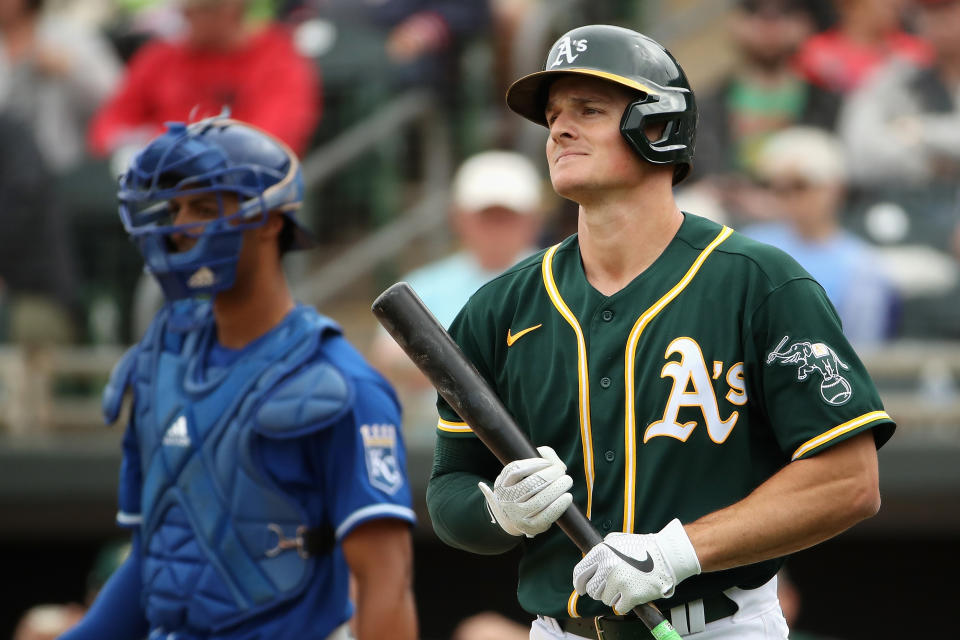Athletics' All-Star says empty ballparks could be key to their success: 'We're used to it'
After all these years, we may have finally learned the true secret to the Oakland Athletics success.
No, it’s not Moneyball.
It’s actually ... silence?
[Still time to join or create a fantasy baseball league for the short season]
That’s one way we could interpret the comments of All-Star third baseman Matt Chapman.
Speaking to the San Francisco Chronicle’s Susan Slusser on Thursday, Chapman suggested that playing games without fans in the ballpark could be to the A’s advantage this season. Why? Because they have grown accustomed to that atmosphere playing home games at the typically half-empty Oakland Coliseum.
From The San Francisco Chronicle:
Chapman, somewhat cantankerous Thursday, also took a little shot at the A’s attendance issues. Asked about playing in front of no fans during the coronavirus pandemic, Chapman said: “I think it’s going to play to our advantage — a lot of our games are pretty quiet in general. We’re used to not having too many fans at the games.
“I think other teams coming in and seeing no fans and a big huge empty stadium and it might be a little cold at night, it just plays to our advantage. We’re used to playing there. We’re used to playing in front of however big or small a crowd is.”
As Slusser prefaced, Chapman didn’t appear to be in a great mood Thursday. We’ll get more into that later. Even if his comments were designed to needle A’s fans more than anything else, let’s see if there’s any truth to them.
In 2019, the A’s averaged 20,521 fans per home game at the Oakland Coliseum, which is roughly 44 percent of the ballpark's capacity. We are not adjusting that for the obvious attendance spikes when the San Francisco Giants, New York Yankees or Boston Red Sox are in town. We’re also not counting the one "home game" played in Japan, In Oakland, the A's posted MLB's fourth best home record at 52-28. On the road, they were a solid 45-36.
In 2018, the team averaged 19,427 fans per home game. In Oakland, they won 50 games, good for fifth best in MLB. On the road, they won 47 games, which was fourth in MLB.
In other words, the A's have been pretty good wherever they’ve played the last two seasons. Though that doesn't necessarily disprove Chapman’s theory.
[Create or join a 2020 Yahoo Fantasy Football League for free today]
Only the Baltimore Orioles, Pittsburgh Pirates, Tampa Bay Rays and Miami Marlins have averaged fewer fans each of the last two seasons. When you take into account how cavernous the Oakland Coliseum is compared to those ballparks, it's a completely different atmosphere and experience for visiting teams.
Maybe we’ll get a clearer perspective this season. If the A’s win 50 games, then we’ll know Chapman is on to something. If it’s closer to 30, he’ll need a new theory.
Chapman wishes A’s had been ‘more proactive’
As noted, Chapman had a lot on his mind Thursday. Aside from the attendance jab, the two-time Gold Glove award winner also expressed disappointment in how clumsily the A’s return has gone.
Between late arrivals and delayed coronavirus testing results that forced the cancellation of team workouts, he feels the team could have been “more proactive” and better prepared.

“I know it’s an honest mistake, but had we been a little more proactive and gotten guys into town earlier like some other organizations did and got testing done before (July 1), there never would have been a testing delay because we wouldn’t have cut it that close,” Chapman said. “It’s not anybody’s fault, per se, but when you wait until the last moment to do things, eventually things are going to catch up to you.”
“We were frustrated we weren’t able to start on the 1st, you look around the league and a lot of teams were starting their spring training on the 1st and a lot of guys were flying into cities days prior to the 1st and getting tested to stay on top of it. I think we were just disappointed our organization took those extra few days and it ended up costing us even more few days when we were all ready to go.”
It turns out much of that was out of the team’s control.
According to the Chronicle report, the A’s couldn’t enter the Coliseum until receiving the green light from the Alameda County health department. The ballpark wasn’t opened until June 26, and the equipment truck from Arizona didn’t arrive until June 29. That gave the team exactly one day to meet MLB’s safety protocols before testing could begin.
Chapman did acknowledge that “it’s uncharted territory for everyone,” but his frustration highlights how little wiggle room teams have and how thin some player’s patience will be throughout this process.
More from Yahoo Sports:

 Yahoo Finance
Yahoo Finance 
